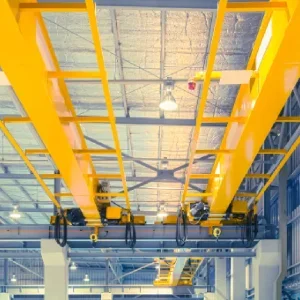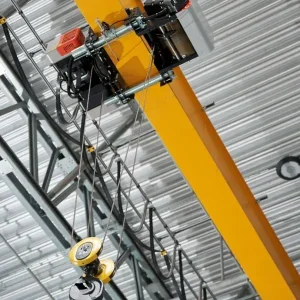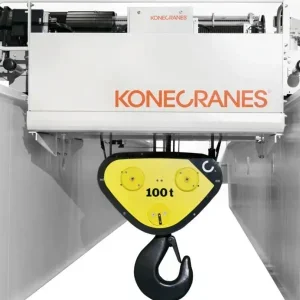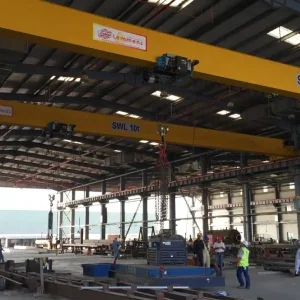Whether large or small, just about everyone is buying basic rigging equipment – chain blocks, wire rope tensioners, clamps, trolleys – from Chinese manufacturers.
Although these products are still manufactured here and there in Europe and the Americas, product sourced in China is so much less expensive than product sold in Western markets, that even the smallest enterprises can turn a profit importing them into Europe. Unbranded, or Asian-labelled product is common in North America and in European countries.
Price competition is heating up even on the lowest end. In January, several national newspapers in the UK featured an advertisement for a 400kg (1,000 lb) capacity wire rope hoist for £100 (Euro 145). “It is more of a promotion item. We do not include it in our range. We saw that there was a gap in the market, that we could sell it for a more competitive price, and we decided to import a couple thousand,” said Martin Newgent, UK sales manager of New-Tool.
“This is not the first time we have done them. We purchased them from another importer two years ago, and we did okay with them,” Newgent says. “We sent out samples and got some HSE [Health & Safety Executive] guys to check them.” The hoists come with a 12-month replacement warranty.
One of New-Tool’s customers was the wholesaler Truebell, which arranged the newspaper coverage. “Do-it-yourself and gardening tools are one of our strongest areas,” says Phil Coles, Truebell sales manager. “It was a good price. It was a bit of a test. We have not run a hoist before,” he says.
The service sell
Western companies are responding to these new competitors in two ways. Some are emphasizing the service and quality of the brand.
Jo Dullens, managing director of Van Der Ree estimates that between 60 and 70% of the product’s value comes from its REMA brand.
“We buy only the high quality,” Dullens says. “We are not a company selling and buying only on price.” A third of the company’s turnover consists of product that is sourced around the world and re-exported to Europe and the Middle East.
Most customers are more interested in service than price, he says. Because of its large stock, the company can deliver in 24 hours in its home market of Belgium, Luxembourg and the Netherlands. In addition to its own REMA brand, it sells A-list brands such as Japan’s Elephant chain blocks in its domestic market.
It also delivers test certificates and offers inspection and repair services.
Service offerings are important for manufacturers as well, such as the Netherlands’ shackle, chain and wire rope fittings manufacturer Van Beest. “The market is dividing into two parts: lowest price and lowest quality, and quality and service,” says sales manager Richard Meer.
“Being a European manufacturer, we can never be the cheapest, but we can be the best in quality and service,” Meer says. “An important part of the market, such as offshore users, are willing to pay a certain price for that. It is always important to have also for customers and end users a good comparison price,” he adds.
Van Beest makes less than half of the total units it sells, and sources from Europe, and China and India.
“What we offer is a quick service on a wide range of products, so that we do not give a reason for our distributors to look at competitors. What I see in the market is increasing demand for quick service, no trouble, a good product, and concentration on a few main suppliers.” Meer says that Van Beest helps out distributors unwilling to carry stock. Its own mass production processes require it to carry large stock-holdings of steel, and produce large volumes of product.
Meer hesitates to say that inexpensive rigging gear is unsafe. “It is not only about safety, it is also about lifetime. It is about working at -20 or -40 degrees. It depends on the use. We believe in our quality and our customers believe in our quality, and so do our users worldwide.
For rigging distributor Certex UK, service includes the inspection of lifting equipment, required by UK law. “We have offered a full package for some time, we don’t like service-only business, but it is a vehicle to pull through sales business,” marketing manager Charles Gillespie says.
The badge sell
Manufacturers and wholesalers often badge material made by third parties.
But with the low price of product, badging seems to be spreading down to large rigging shop chains. Many vendors have introduced a less-expensive product that is sourced from China or other low-cost countries but marked with a Western badge. These ranges tend to be the most common lifting equipment: chain blocks and lever hoists, wire rope tensioners, and simple trolleys and clamps. This mid-level product is a compromise of the price and service elements of both extremes.
In October 2005, UK rigging supplier Cosalt – known for its offshore products – launched its own First Gear range of branded product that it markets to end users. Prior to this range, the company supplied any brand in the market. Now it offers its own range as well.
“The market has changed in recent years, and what is commonplace now not just in lifting gear market, but also others, is Far Eastern imports. As the company needs to compete effectively with imported prods, so we need to import products. We needed to make a move to maintain our customers,” says Nick Connolly, who was Cosalt’s national lifting manager when the programme was being finalised, and is now southern area manager.
“We are in a position where we can offer both options – in preference ours,” Connolly says. The range is economical and competitive, he argues. “It is economical rather than being cheap – the quality is reasonably good.”
Depending on the product being compared to, there can be more than a 100% difference in price, according to Connolly. “At the top end, there is a substantial difference. At the economy end of suppliers, there may be a price edge, there may not be.”
In comparison with lower-priced product, Connolly says that First Gear’s advantage is in service – every unit is proof-load tested by the importer. In other words, they take more responsibility for the equipment than a basic importer might.
“Our equipment is Chinese in origin. We don’t hide that,” Connolly says. “Part of the thinking behind it was continuity of product. There’s so much product imported, and often the quality is suspect, and it comes from many sources. So consequently the products can change,” he says. Two sequential container-loads of 1t-capacity chain blocks may have completely different designs and be made in different factories.
Connolly says that Cosalt’s importer maintains product continuity, and also proof-tests each hoist.
At the upper end, this kind of testing grades into the testing any manufacturer would do of component suppliers. For example, German rigging gear supplier Pfaff-Silberblau designs and engineers lifting equipment that is at least partly manufactured by sub-contractors in Poland, Korea, Czechoslovakia, Japan and China, according to material handling division executive Michel Favé.
Three years ago the company launched the economy ‘silver’ range. Lever hoists run from 750kg to 6t lifting capacity, and chain blocks run from capacities of 500kg to 10t.
Every unit is static tested to 1.5 times maximum load, and dynamically tested to 1.15 times maximum load.
“Our core business is the design and supply of products that are produced partly, totally or not at all by ourselves or by a partner, with or without chain,” Favé told Hoist.
Not every supplier tests hoists in the West, though. Gillespie says that Certex’s Bulldog hoist is made in a “Far East” factory and supplied by Hoisting Equipment Specialists of Australia. HES developed the hoist over the past 15 years, Gillespie says. It visits the factory to inspect the product and witness the factory’s proof-load testing of every hoist before dispatch.
Gillespie argues that the Bulldog range is a step above the most basic product lines. Starting in June, the Bulldog lever hoist will include a slipping clutch to prevent overloads. “When the gear comes back, it is damaged, because it is overloaded, because it can be. This gear has to put up with lots of abuse. A slipping clutch distinguishes cheap product from quality product,” he says. Last year, Certex UK ended its association with premium-brand rigging equipment manufacturers Crosby and Bridon when its management bought it out from the FKI Group. Certex chooses not to operate at the lowest end of the market, Gillespie says. “We don’t go chasing low-price customers because we can’t make any money doing it. If you go down a cheap end, basically you are on the road to ruin in our view,” he says.
Gillespie does not go so far as to argue that inexpensive lifting equipment is unsafe. “It’s a question of degrees,” he says. “You get what pay for. Absolutely you can get good value gear but the performance has got to be there as well. If you simply get the cheapest you won’t get the performance. And, in extreme cases –there are many examples – they can be dangerous.”
Going wholesale
Another product tier has emerged in the USA over the last few years. Wholesaler All Material Handling has begun to ship lifting and rigging gear direct from the factory to the customer, an arrangement that cuts prices by 20-25%.
“The idea is to trim overhead costs out of the price of products by simply reducing the expense of bringing products to market by eliminating warehousing, storing and shipping,” says president Peter Brettner.
Unlike its competitors, AMH will take an order of less than one container, Brettner says. The minimum factory-direct order value is $10,000 from a standard catalogue. It only sells to trade distributors, not end users. The products take three months to arrive.
AMH works with the agents of factories from which it sources material to have each customer’s equipment packed up on separate pallets. A shipping company loads several of these pallets into a container, and then separates them on arrival.
Customers of this service have to have a significant and repeat business, Brettner says. “A lot of hoists are off-the-shelf items. It is fairly easily predictable what demand will be.”
The company also works with US distributor Central Service and Supply in Des Moines, Iowa to offer the standard shelf-service for the same items. “Usually our customers do both – order the factory-direct shipments and in addition use the warehouse for spike orders, unexpected demand, when they run low, or for larger units which don’t move as frequently, or where sales are not as predictable,” Brettner says.
AMH does perform a quality control function, even though it works its Chinese hoist and sling factories through an agent, Brettner argues. AMH chooses the manufacturers and determines the testing system the manufacturers use. AMH generally sells hoists unchained.
Brettner says that the distribution idea came from experience with German buying groups developed while working for Austrian chain manufacturer Pewag. “I saw how in Germany there are lots of these buying groups where organisations find members and form buying groups to basically reduce the cost of procurement. So rather than waiting for organisations to be founded here. I had the idea of going to market with the advantage of grouping customers together. It sort of evolved from this basic concept.”






